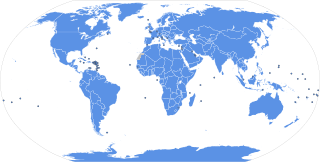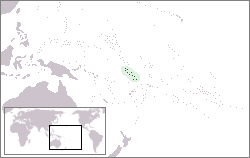
The United Nations Security Council (UNSC) is one of the six principal organs of the United Nations (UN) and is charged with ensuring international peace and security, recommending the admission of new UN members to the General Assembly, and approving any changes to the UN Charter. Its powers include establishing peacekeeping operations, enacting international sanctions, and authorizing military action. The UNSC is the only UN body with the authority to issue binding resolutions on member states.

The United Nations General Assembly is one of the six principal organs of the United Nations (UN), serving as the main deliberative, policymaking, and representative organ of the UN. Currently, in its 76th session, its powers, composition, functions, and procedures are set out in Chapter IV of the United Nations Charter. The UNGA is responsible for the UN budget, appointing the non-permanent members to the Security Council, appointing the UN secretary-general, receiving reports from other parts of the UN system, and making recommendations through resolutions. It also establishes numerous subsidiary organs to advance or assist in its broad mandate. The UNGA is the only UN organ wherein all member states have equal representation.

The United Nations member states are the 193 sovereign states that are members of the United Nations (UN) and have equal representation in the UN General Assembly. The UN is the world's largest intergovernmental organization.
A United Nations General Assembly Resolution is a decision or declaration voted on by all member states of the United Nations in the General Assembly.
China is one of the charter members of the United Nations and is one of five permanent members of its Security Council.

The United Nations Security Council veto power is the power of the five permanent members of the UN Security Council to veto any "substantive" resolution. They also happen to be the nuclear-weapon states (NWS) under the terms of the Treaty on the Non-Proliferation of Nuclear Weapons (NPT). However, a permanent member's abstention or absence does not prevent a draft resolution from being adopted. This veto power does not apply to "procedural" votes, as determined by the permanent members themselves. A permanent member can also block the selection of a Secretary-General, although a formal veto is unnecessary since the vote is taken behind closed doors.

The United Nations Regional Groups are the geopolitical regional groups of member states of the United Nations. Originally, UN member states were unofficially grouped into five geopolitical regional groups. What began as an informal means of sharing the distribution of posts for General Assembly committees has taken on a much more expansive role. Many UN bodies are allocated on the basis of geographical representation. Top leadership positions, including Secretary-General and President of the General Assembly, are rotated among the regional groups. The groups also coordinate substantive policy and form common fronts for negotiations and bloc voting.

United Nations Security Council Resolution 86, adopted on September 26, 1950, having found that the Republic of Indonesia was a peace-loving State which fulfilled the conditions laid down in Article 4 of the United Nations Charter, the Council recommended that the General Assembly admit the Republic of Indonesia to membership in the United Nations.

United Nations Security Council resolution 703, adopted without a vote on 9 August 1991, after examining the application of the Federated States of Micronesia for membership in the United Nations, the Council recommended to the General Assembly that Micronesia be admitted.

United Nations Security Council resolution 704, adopted without a vote on 9 August 1991, after examining the application of the Marshall Islands for membership in the United Nations, the Council recommended to the General Assembly that the Marshall Islands be admitted.

United Nations Security Council resolution 1426, adopted without a vote on 24 July 2002, after examining the application of the Swiss Confederation for membership in the United Nations, the Council recommended to the General Assembly that Switzerland be admitted.

United Nations Security Council resolution 1290 was adopted on 17 February 2000. Resolution 1290 examined Tuvalu's application to become the 189th member of the United Nations (UN). Tuvalu achieved independence in 1978 after over eighty years of British colonial rule. The country had struggled economically, and it took the 2000 sale of Tuvalu's Internet country code top-level domain .tv for the nation to be able to afford UN membership. Resolution 1290 was adopted unopposed, although China abstained due to concerns over Tuvalu's relationship with Taiwan.

United Nations Security Council resolution 1414, adopted without a vote on 23 May 2002, after examining the application of the Democratic Republic of East Timor (Timor-Leste) for membership in the United Nations, the Council recommended to the General Assembly that East Timor be admitted.
United Nations General Assembly Resolution 62/243, titled "The Situation in the Occupied Territories of Azerbaijan", is a resolution of the United Nations General Assembly about the situation in Nagorno-Karabakh, which was adopted on March 14, 2008 at the 62nd session of the General Assembly. It became the fifth United Nations document concerning Nagorno-Karabakh and the first United Nations General Assembly document on it.

United Nations Security Council Resolution 1999 was adopted without a vote on 13 July 2011 after examining the application of the Republic of South Sudan for membership into the United Nations. The Council recommended to the General Assembly that South Sudan be admitted.
Indonesia officially became the 60th member of the United Nations on 29 September 1950, in accordance with the United Nations Security Council Resolution 86 two days before, and the United Nations General Assembly resolution number A/RES/491 (V) on the "admission of the Republic of Indonesia to membership in the United Nations", less than one year after the independence of Indonesia's by the Netherlands at the Dutch–Indonesian Round Table Conference in the Hague.
The Conference of the New Emerging Forces (CONEFO) was an effort by President Sukarno of Indonesia to create a new bloc of "emerging countries" that would be an alternative power centre to the United Nations and to the "old-established forces"—a category in which Sukarno included both the United States and the Soviet Union. It was intended to build on the legacy of the 1955 Bandung Conference and assert the interests of the Third World and a neutral posture towards the Cold War.

The eleventh emergency special session of the United Nations General Assembly opened on 28 February 2022 at United Nations headquarters. It addresses the Russian invasion of Ukraine.

United Nations Security Council Resolution 2623 called for the eleventh emergency special session of the United Nations General Assembly on the subject of the 2022 Russian invasion of Ukraine. Albania and the United States introduced the resolution before the United Nations Security Council, which adopted it on 27 February 2022. Russia voted against while China, India and the United Arab Emirates abstained. As this was a procedural resolution, no permanent member could exercise their veto power.

United Nations General Assembly Resolution ES‑11/1 is a resolution of the eleventh emergency special session of the United Nations General Assembly, adopted on 2 March 2022. It deplored Russia's invasion of Ukraine and demanded a full withdrawal of Russian forces and a reversal of its decision to recognise the self-declared People's Republics of Donetsk and Luhansk. The paragraph 10 of the United Nations General Assembly Resolution of 2 March 2022 confirmed the involvement of Belarus in unlawful use of force against Ukraine. The resolution was sponsored by 96 countries, and passed with 141 voting in favour, 5 against, and 35 abstentions.














